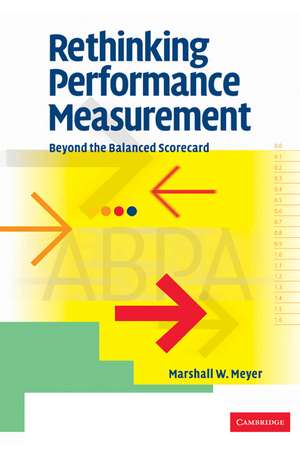Rethinking Performance Measurement: Beyond the Balanced Scorecard
Autor Marshall W. Meyeren Limba Engleză Paperback – 18 mar 2009
| Toate formatele și edițiile | Preț | Express |
|---|---|---|
| Paperback (1) | 313.85 lei 6-8 săpt. | |
| Cambridge University Press – 18 mar 2009 | 313.85 lei 6-8 săpt. | |
| Hardback (1) | 723.75 lei 6-8 săpt. | |
| Cambridge University Press – 8 ian 2003 | 723.75 lei 6-8 săpt. |
Preț: 313.85 lei
Nou
Puncte Express: 471
Preț estimativ în valută:
60.06€ • 65.22$ • 50.45£
60.06€ • 65.22$ • 50.45£
Carte tipărită la comandă
Livrare economică 22 aprilie-06 mai
Preluare comenzi: 021 569.72.76
Specificații
ISBN-13: 9780521103268
ISBN-10: 0521103266
Pagini: 220
Ilustrații: 53 b/w illus. 4 tables
Dimensiuni: 152 x 229 x 13 mm
Greutate: 0.33 kg
Editura: Cambridge University Press
Colecția Cambridge University Press
Locul publicării:Cambridge, United Kingdom
ISBN-10: 0521103266
Pagini: 220
Ilustrații: 53 b/w illus. 4 tables
Dimensiuni: 152 x 229 x 13 mm
Greutate: 0.33 kg
Editura: Cambridge University Press
Colecția Cambridge University Press
Locul publicării:Cambridge, United Kingdom
Cuprins
Introduction; 1. Why are performance measures so bad?; 2. The running down of performance measures; 3. In search of balance; 4. From cost drivers to revenue drivers; 5. Learning from ABPA; 6. Managing and strategising with ABPA; Notes; Index.
Recenzii
"This book is a must-buy for any senior managers of service firms that aspire to have their companies survive and prosper even as competition inevitably increases. Building on a platform of insightful field work Meyer uses a compelling and incisive logic to propose a monitoring and measurement methodology (APBA) that allows firms to simultaneously pursue customer differentiation on the customer front and efficiency on the functional front all by driving strategic decision-making down to the level of the customer." Professor Ian C MacMillan, The Wharton School, University of Pennsylvania
"Rethinking Performance Measurement challenges fundamentally some of the assumptions held about measurement today." Professor Andy Neely, Cranfield School of Management
"I really like this book. It takes an honest look at the balanced scorecard and offers an alternative approach that addresses many of the problems associated with the scorecard approach. This book is a 'must read' for managers in balanced scorecard organizations!" Professor Harold Doty, School of Management, Syracuse University
"There is much management theory and much management practice and mountains of books on each. This is a rare book that seeks to use theory to enhance practice. It takes as fundamental that performance measurement always skews behavior so we had better get better at measuring what is really important and always realise we will never get it exactly right, but that is no reason not to do it." Professor Sandra Dawson, Judge Institute of Management Studies, University of Cambridge
"Meyer challenges the traditional tenets of long-term performance measurement with a compelling argument for rejecting the 'balanced scorecard theory'.... The six succinct chapters skillfully intertwine the author's thorough research with contemporary management practice. Highly recommended." Choice
"Rethinking Performance Measurement challenges fundamentally some of the assumptions held about measurement today." Professor Andy Neely, Cranfield School of Management
"I really like this book. It takes an honest look at the balanced scorecard and offers an alternative approach that addresses many of the problems associated with the scorecard approach. This book is a 'must read' for managers in balanced scorecard organizations!" Professor Harold Doty, School of Management, Syracuse University
"There is much management theory and much management practice and mountains of books on each. This is a rare book that seeks to use theory to enhance practice. It takes as fundamental that performance measurement always skews behavior so we had better get better at measuring what is really important and always realise we will never get it exactly right, but that is no reason not to do it." Professor Sandra Dawson, Judge Institute of Management Studies, University of Cambridge
"Meyer challenges the traditional tenets of long-term performance measurement with a compelling argument for rejecting the 'balanced scorecard theory'.... The six succinct chapters skillfully intertwine the author's thorough research with contemporary management practice. Highly recommended." Choice
Notă biografică
Descriere
This book explains why performance measurement remains a vexing problem for business firms and other kinds of organisations.








